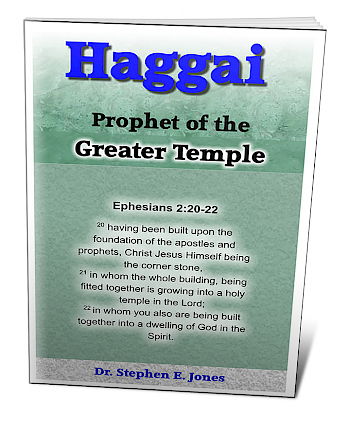Latest Posts
View the latest posts in an easy-to-read list format, with filtering options.

Haggai prophesied in the years after the end of Judah's captivity to Babylon. The first major project was to rebuild the temple in Jerusalem. This project actually prophesied of a greater temple that was yet to be built made of living stones.
Category - Bible Commentaries

When the work on the second temple resumed in the days of Darius the Great (520 B.C.), the people of Samaria hired lawyers to stop the work. The Samaritan leaders did not believe that the Persian king had allowed Zerubbabel to rebuild the temple.
So Tattenai, the governor of a nearby province sent a letter to King Darius, which is recorded in Ezra 5:6-17, asking him (in verse 17), “let a search be conducted in the king’s treasure house, which is there in Babylon, if it be that a decree was issued by King Cyrus to rebuild this house of God at Jerusalem.”
Ezra 6:1 tells us that Darius decreed that a search should be made. They found the original decree from Cyrus, which is quoted in Ezra 6:3-5. Not only did it confirm the building of the temple, it also stated in verse 4, “let the cost be paid from the royal treasury.”
So Darius then commanded Tattenai in Ezra 6:7, 8,
7 Leave this work on the house of God alone; let the governor of the Jews and the elders of the Jews rebuild this house of God on its site. 8 Moreover, I issue a decree concerning what you are to do for these elders of Judah in the rebuilding of this house of God: the full cost is to be paid to these people from the royal treasury out of the taxes of the provinces beyond the River, and that without delay.”
No doubt Tattenai regretted sending his letter, because not only did he lose his case, but now he had to pay for the building project in full out of the taxes of the province. Tax money that would have been sent to the treasury of Darius was diverted to Jerusalem. Tattenai, whose name means “gift,” was forced to give money to finance the building of the temple in Jerusalem!
Darius also issued a threat to any who refused to comply with his decree. Ezra 6:11 says,
11 And I issued a decree that any man who violates this edict, a timber shall be drawn from his house and he shall be impaled on it and his house shall be made a refuse heap on account of this.
Well, that explains why the opposition quickly ceased and the builders were able to complete the project in just five years.
Ezra 6:15 then concludes, as we have already shown, saying,
15 And this temple was completed on the third day of the month Adar; it was the sixth year of the reign of King Darius.
The date of completion, by our modern calendar, was March 15, 515 B.C. The next month started the 7th year of Darius, since their regnal years began in April.
The fact that Persia—the second beast empire—financed the building of the temple is highly significant. This set the pattern for the building of the spiritual Temple represented by this physical temple in Jerusalem. Recall that Isaiah 44:28 prophesied two centuries earlier:
28 It is I who says of Cyrus, “He is My shepherd! And he will perform all My desire.” And he declares of Jerusalem, “She will be built,” and of the temple, “Your foundation will be laid.”
This prophecy implied that if Cyrus were to make such a decree, then he would also take the responsibility for financing the construction. Furthermore, this aspect of Cyrus’ rule was what made him a type of messiah, as he is called a few verses later in Isaiah 45:1.
Now that all four beast systems have run their courses; now that Babylon has repeated its oppression in the form of Mystery Babylon, we are now seeing the rise of new “kings from the east,” whom God has raised up to overthrow Babylon and to finance the building of the New Jerusalem and the New Temple.
This suggests that God will use the new kings from the east to finance the construction of the New Jerusalem World Order for the Kingdom Age that is coming. While Christians finance and support the building of a third earthly temple in Jerusalem—for the purpose of animal sacrifice—God is planning something much greater.
The divine plan is to build a New Covenant temple and a New Jerusalem that is not limited to a few acres in the old land. This temple will be made of living stones taken from all nations in order to establish God’s original intent—as revealed to Abraham—to bless all the families of the earth.
Haggai understood that the second temple in Jerusalem was nothing like Solomon’s temple. Yet it was a type of something so great that even Solomon’s temple could never equal it. Solomon knew that his temple, however grand, could not contain the God of heaven (1 Kings 8:27). Only a temple made of living stones was able to provide an earthly home for the God of heaven.
If Solomon’s temple could not contain the God of heaven, how could Zerubbabel succeed where Solomon had failed? At least Solomon had the Ark of the Covenant to put into the Most Holy Place. Zerubbabel was unable to place the Ark into his temple, because it had been taken by Jeremiah to another part of the world.
Even if the Ark had been returned, the glory of God had already departed from that place (Ezekiel 11:23), never again to return. As with Shiloh in earlier times, Ichabod was pronounced upon the city of Jerusalem (Jer. 7:12-14).
In view of these things, Haggai assured the people that they were truly doing a prophetic work, establishing the pattern for a greater temple yet to come. Hag. 2:4 says,
4 “But now take courage, Zerubbabel,” declares the Lord, “take courage also, Joshua son of Jehozadak, the high priest, and all you people of the land take courage,” declares the Lord, “and work; for I am with you,” says the Lord of hosts.
This work was not in vain, because it was a work of faith. No labor on earth is of value except when it is done by faith. Heb. 11:6 says, “without faith it is impossible to please Him.” Faith comes by hearing the word (Rom. 10:17), so when a work is done by faith, it is the work of faith-obedience, which will always have value and be rewarded.
Oftentimes, we are led to travel even long distances in obedience to God in order to do things that appear to be useless to others. Of what value is it, they say, to waste time and resources to speak a word at a remote place? Walking by sight is the Tattenai of every spiritual work. The flesh always wars against the Spirit (Rom. 7:23). To those who have received divine instruction to do spiritual works, the word of the Lord has been spoken to you through Haggai: “Take courage and work; for I am with you.”
No work of faith is ever wasted. One of the main reasons why God issues such instructions is to allow participation (and reward) for things yet unseen, which may not be fulfilled for many generations. The people in the days of Zerubbabel and Haggai were thus able to help us build the New Temple today, even though they lived long ago.
Those who took courage throughout past centuries, those who heard the voice of God and responded in obedience, those who were willing to overcome the opposition and the ridicule of those without such light—these will not fail to receive the reward given to the generation that finishes the work.
Those who built the second temple by faith were sowing seeds of the true temple. Each generation after them has had opportunity to water those seeds and cultivate the field. We today are called to continue watering the field until the time of harvest.
Paul says in 1 Cor. 3:6-9,
6 I planted, Apollos watered, but God was causing the growth. 7 So then neither the one who plants nor the one who waters is anything, but God who causes the growth. 8 Now he who plants and he who waters are one; but each will receive his own reward according to his own labor. 9 For we are God’s fellow workers; you are God’s field, God’s building.
We are all in the same work, each in his/her own way, and as long as we are obedient to the task that God has called us to do, we are “fellow workers” in God’s field. Each will be rewarded according to his faith and obedience.
Hag. 2:5 continues,
5 As for the promise which I made you when you came out of Egypt, My Spirit is abiding in your midst [tavek, “the middle”]; do not fear!
In those days, the Ark was the seat of God’s presence, but the Ark had disappeared from their midst. Nonetheless, the Spirit of God was abiding in their midst. This is also a veiled prophecy of another day when the Spirit of God was to come to abide within us in a greater way. This is ultimately the promise that God made with Israel and with all of us.
Under the Old Covenant, God’s presence abode in their midst, but externally in a temple. Under the New Covenant, however, the promise is to abide within them as Immanuel, “God with(in) us.”